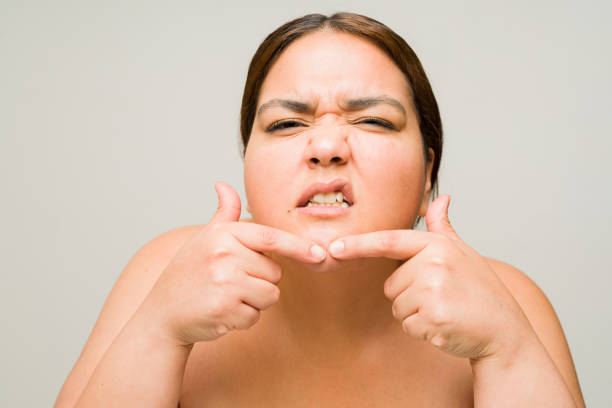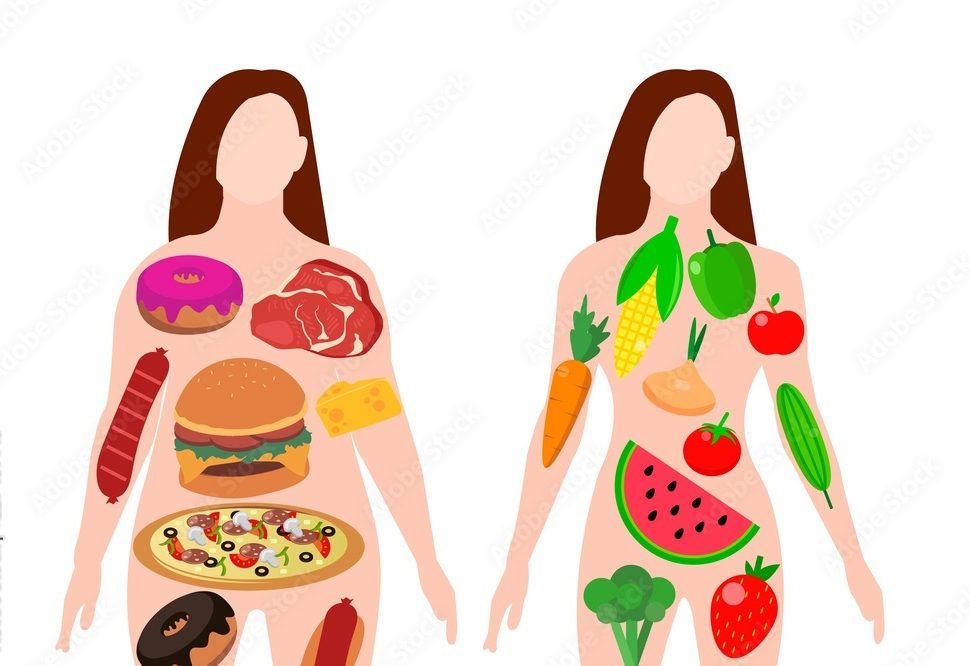Ever wondered if gaining weight could make your skin break out and cause acne? Today we figure out what happens when your weight changes and how it affects your skin.
Contents
Does Weight Gain Cause Acne?

When it comes to weight gain and acne, you might be wondering if there’s a connection. Well, the answer is not as simple as a straight yes or no. While weight gain doesn’t directly cause acne, there are underlying factors that link the two issues. Let’s read the details.
1. Hormonal Imbalance: A Key Player:
Hormones play a crucial role in both weight gain and acne. For teenage girls, in particular, hormonal imbalances can be the main culprits for both conditions. Conditions like Polycystic Ovary Syndrome (PCOS) are not only associated with weight gain but also with increased androgen levels, which can contribute to acne breakouts.
2. Insulin Resistance: A Contributing Factor:
Weight gain often goes hand in hand with insulin resistance. Insulin is a hormone that regulates blood sugar levels, but when the body becomes resistant to its effects, it can lead to various health problems, including acne. Insulin resistance can further contribute to hormonal imbalances, worsening acne symptoms.
3. Inflammation: The Skin’s Response:
Weight gain can trigger an inflammatory response in the body, and this inflammation can worsen acne. When the body is inflamed, it releases certain substances that can aggravate the skin, leading to breakouts.
The Relationship Between Weight Gain and Acne:
1. Research on Weight Gain and Acne:
Research has shown a significant connection between weight gain and acne. A population-based study conducted in 2012 involving over 3,500 teenagers aged 18 or 19 found that as weight increased, so did the frequency of acne. Although this study provides evidence of a relationship, it’s important to understand the underlying factors that contribute to this connection.
2. Hormonal Changes and Acne:
Hormonal imbalance is a key player in the relationship between weight gain and acne. When it comes to teenagers with ovaries, both weight gain and acne are closely tied to the function of the ovaries. Conditions like Polycystic Ovary Syndrome (PCOS) can lead to elevated levels of androgens, which not only cause weight gain but also affect acne. Androgens, also known as male hormones, are present in both males and females and are one of the top causes of acne.
3. Insulin Resistance and Acne:
Another factor that contributes to the relationship between weight gain and acne is insulin resistance. Insulin resistance often accompanies weight gain and can exacerbate hormonal imbalances, further contributing to acne problems. Insulin resistance is a condition in which the body’s cells become resistant to the effects of insulin, leading to higher levels of insulin in the blood. This not only affects blood sugar levels but can also impact hormone production, including androgens, which can worsen acne.
Managing Acne with Weight Loss:

If you’re dealing with both weight gain and acne, you may be wondering if there’s a way to manage both of these issues effectively. The good news is that losing weight can actually help improve your acne condition. Here’s how:
- Reducing Hormonal Imbalances: Weight gain, especially in the form of excess body fat, can lead to hormonal imbalances that contribute to acne. By losing weight, you can help restore hormonal balance and decrease the frequency and severity of acne breakouts.
- Improving Insulin Sensitivity: Weight gain often goes hand in hand with insulin resistance, a condition where your cells become less responsive to the effects of insulin. This can increase your body’s production of insulin, leading to higher levels of androgens, a group of hormones that can trigger acne. Losing weight improves insulin sensitivity, effectively reducing androgens and improving acne.
- Reducing Inflammation: Excess body fat is associated with chronic low-grade inflammation in the body. This inflammation can worsen acne symptoms and contribute to the development of acne lesions. Losing weight can help reduce inflammation, leading to clearer and healthier skin.
You may be wondering, how can you effectively lose weight to manage your acne? Here are a few steps to get started:
- Adopt a Balanced Diet: Focus on consuming whole, nutrient-dense foods such as fruits, vegetables, lean proteins, and healthy fats. Avoid excessive intake of processed foods, sugary snacks, and foods high in refined carbohydrates. A balanced diet not only promotes weight loss but also supports good skin health.
- Engage in Regular Physical Activity: Incorporating regular exercise into your routine is key for weight loss. Aim for a combination of cardiovascular exercises, like brisk walking or cycling, and strength training exercises to help build muscle and boost your metabolism. Exercise also improves blood circulation, delivering more oxygen and nutrients to your skin, promoting a healthy complexion.
- Get Adequate Sleep: Poor sleep quality and duration have been linked to weight gain and acne flares. Make sure you’re getting enough restorative sleep every night, aiming for 7-8 hours. Establish a consistent bedtime routine and create a sleep-friendly environment to optimize your sleep quality.
Frequently Asked Questions:
Does weight gain cause acne?
Weight gain can lead to hormonal imbalances and insulin resistance, which can contribute to acne breakouts. When the pores in your skin become clogged, it can result in pimples or red and flesh-colored bumps with white pustules on top.
Will losing weight help improve my acne?
Losing weight can lead to clearer skin as it often involves making healthier food choices. Eating less fatty and greasy foods may reduce breakouts. While the connection between diet and acne is not scientifically proven, many people report experiencing acne breakouts after consuming unhealthy foods.
Why am I gaining weight quickly and breaking out?
Conditions like Polycystic Ovary Syndrome (PCOS) can cause weight gain, particularly around the belly, and make it challenging to lose weight. PCOS can also lead to acne or oily skin, irregular periods, and hair growth on the face and body.

Hello, I’m Ravindra. Over the years, I’ve immersed myself deeply into the world of fitness and health, transforming both my body and mind. Writing has allowed me to share my journey, insights, and expertise with those just starting out and seasoned fitness enthusiasts alike. Beyond just routines and diets, I believe in inspiring others to adopt a holistic approach to well-being.
